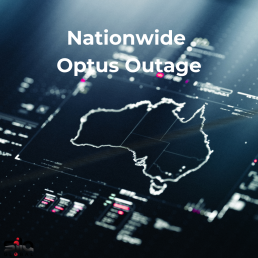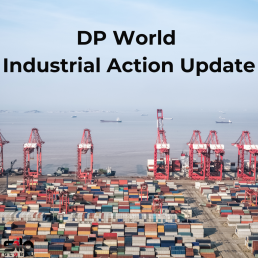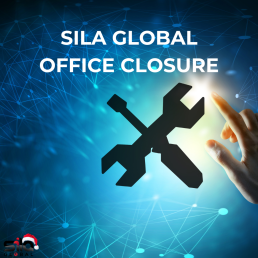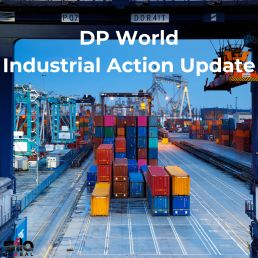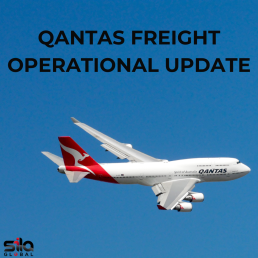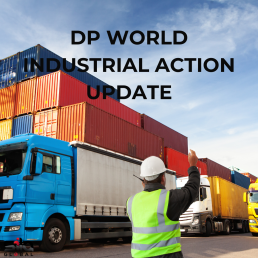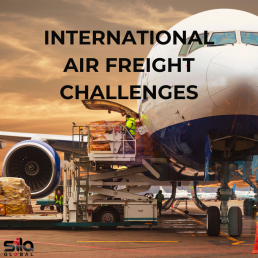Nationwide Optus Outage
Dear Valued Customers & Partners,
Optus is currently dealing with a nationwide outage causing service disruptions across many platforms. If you're unable to contact us by phone, kindly email our friendly team and we will get back to you as soon as possible.
Please see below notice from Optus with relevant links regarding the outage.
Our engineers are currently investigating a network fault that is impacting Optus Mobile & Fixed customers, we apologise for any inconvenience caused.
See links below regarding the outage.
- Optus Australia: Major phone and internet issue across Australia, impacting Melbourne trains | news.com.au — Australia’s leading news site\
- https://downdetector.com.au/status/optus/
- Nationwide Optus outage hits businesses, customers and PTV (smartcompany.com.au)
Thank you for your continued trust and partnership and should you have any questions or concerns, kindly reach out to our dedicated team!
SILA Imports - imports@sila.net.au
SILA Exports - exports@sila.net.au
SILA Sales - sales@sila.net.au
T: (+61) 07 3908 1690
SILA Global Pty Ltd
DP World Industrial Action Update
Dear Valued Customers & Partners,
DP World today have announced members of the Construction, Forestry, Maritime, Mining and Energy Union (CFMMEU) have, despite efforts to reach an understanding, outlined a further series of work bans and stoppages up to and including Monday 20 November.
Impacted Locations and Actions
- Brisbane: Bans on the performance of overtime, shift extensions, loading or unloading trucks, and more.
- Sydney: Bans on the performance of upgrades on day and night shifts, ban on working nominated shipping lines, and more.
- Melbourne: Bans on the performance of upgrades, shift extensions, upgrades, and more
- Fremantle: Ban on the performance of overtimes, extensions, upgrades, and more.
Read the full media statement HERE
Full list of upcoming protected industrial action HERE
Please note that these bans & stoppages will significantly impact our services, and we appreciate your understanding and flexibility during this period. Our team is committed to minimising disruptions and ensuring the smoothest operations possible. We will keep you updated on any further developments.
We acknowledge the potential impact of these disruptions; however, please be advised that SILA will not assume liability for any additional charges arising from these industrial actions.
Thank you for your continued trust and partnership and should you have any questions or concerns, kindly reach out to our dedicated team!
SILA Imports - imports@sila.net.au
SILA Exports - exports@sila.net.au
SILA Sales - sales@sila.net.au
T: (+61) 07 3908 1690
SILA Global Pty Ltd
VICT Review to Landside Charges & Infrastructure Surcharge
Dear Valued Customers,
2024 Landside Fee Increases
Freight & Trade Alliance (FTA) and the Australian Peak Shippers Association (APSA) has received the following 60-day industry notice from VICT in relation to tariff adjustments.
Industry Notice - Vehicle Booking System (VBS) Charges and Storage Charges
Victoria international Container Terminal (VICT) has experienced a notable increase in business costs during the past twelve months. While VICT makes every effort to absorb these costs, there remains a need to recover a portion of the costs associated with the landside operations. This adjustment is essential to ensure VICT continues to provide an efficient service to our customers.
The surge in inflation and increase in energy prices have been a significant contributor to the unavoidable higher operating costs.
VICT is investing in an expansion project which will increase terminal infrastructure and enhance our vehicle booking system, by 30%. The new equipment and increased capacity will be fully operational and available from early in the first quarter of 2024.
In addition, VICT continues to invest heavily in technology to ensure our automated equipment and processes remain up to date to deliver consistent and efficient service levels that the industry expects from us.
Despite our efforts to contain and absorb some of the cost increases, VICT has been unable to avoid increases in our operational input and lease cost which, without adjustment to some of our infrastructure related costs, would negatively impact the continued service levels that our customers expect from us.
The landside charges recover part of the costs related to maintenance and operation costs on our landside, property costs, capital investment to the landside infrastructure.
The revised charges have been a direct result of increasing costs and are a direct pass through to our customers to recover these on-going costs.
Read the full VICT notice HERE
VICT - Industry Notice - Late Receival Fee
Effective from January 1, 2024, VICT will be increasing their Late Receival Fee, for receipt of export containers after the agreed vessel cut-off, to $402.75 + GST per container. This includes vessels sub-contracted to Victoria International Container Terminal by other container terminals.
Read the full VICT notice HERE
Thank you for your continued trust and partnership and should you have any questions or concerns, kindly reach out to our dedicated team!
SILA Imports - imports@sila.net.au
SILA Exports - exports@sila.net.au
SILA Sales - sales@sila.net.au
T: (+61) 07 3908 1690
SILA Global Pty Ltd
DP World Landside Fee Increases
2024 Landside Fee Increases
Kindly find below notice from DP World Australia (DPLWA) regarding Landside Fee Increases from 1st January 2024.
In accordance with the National Voluntary Guidelines (NVG) DPWA are providing the industry with notice of intent to change landside pricing effective from 1 January 2024 in accordance with the Attachments and give 60 days’ notice of the pending changes.
DPWA forecasts more than $600 m in capital expenditure across 2023 - 2026 will be required across our four terminals to invest in key equipment, civil expansion works and other equipment to cater for greater landside demand going forward. These investments are required to ensure we continue to deliver the landside service levels required by the industry.

Other Capex spend:
• Maintenance and expansionary pavements work at all terminal locations.
• IT infrastructure and system upgrades at all terminal locations
DPWA is committed to the intentions of the National Voluntary Guidelines, inclusive of the review and notification of landside service charges. We are making changes to our processes across jurisdictions to provide industry and government with a consistent approach where possible.
As a valued industry participant DPWA welcomes your feedback which can be provided to NSW.landsidefeedback@dpworld.com.au. Feedback received prior to Friday 24 November 2023, will be consolidated, and responded to. Final notice will be published on the DPWA Customer Portal by 1 January 2024.
2024 Weight Mis-Declaration Fee
Additionally, DPWLA have released an update on the introduction of their Weight Mis-Declaration Fee which will come into effect in the first half of 2024.
Following on from the introduction of a calibrated weighing device (Pondus) in Melbourne, DPWA Sydney & DPWA Fremantle customers are advised that the “Weight Mis-Declaration Fee for Import Cargo (PONDUS)” is expected to be implemented in Sydney & Fremantle in the first half of 2024 (date to be confirmed).
DPWA Sydney & DPWA Fremantle will provide 30 days’ notice prior the date of implementation.
The introduction of this Fee is to mitigate the safety hazards associated with mis-declared containers throughout the supply chain network.
Import Cargo will be statistically sampled and weighted on the Pondus stand. A fee will be applied on unit having an absolute weight variance greater than one metric tonne compared to declared weight. This fee will be charged to the transport operator. Containers that record an absolute weight variance of less than one metric tonne, will not incur the fee.

CTAA Notice Re: DPWLA Landside Fee Increases
- Terminal Access Charge (TAC): Full Exports - a whopping 52.52% increase in Melbourne; 38.80% increase in Sydney; 37.50% in Brisbane.
- Terminal Access Charge (TAC): Full Imports - 26.18% increase in Brisbane; 25.49% in Sydney; 21.22% in Melbourne.
In contrast in Fremantle where the WA Government still owns Fremantle Ports, and landside fee increase percentages have been capped in terminal leases, the Terminal Access Charges (TACs) for full imports and full exports will only rise by 5%.
Vehicle Booking System (VBS) and ancillary charges are increasing by various amounts too, including:
- VBS Slot Fees and full Stack Run Fees (per slot) increasing by 49.74% in Fremantle (as a charge outside of the capped fee agreement in the Fremantle terminal lease) and by 35.65% in Melbourne, Sydney & Brisbane.
- Energy Charge (per export and import unit) rising by 13.96%
- Vehicle Misdeclaration Fee increase by 23.33%
- Various other charges increasing by percentages between 7.51% to 9.45% - all above CPI.
Read the full notice HERE
Thank you for your continued trust and partnership and should you have any questions or concerns, kindly reach out to our dedicated team!
SILA Imports - imports@sila.net.au
SILA Exports - exports@sila.net.au
SILA Sales - sales@sila.net.au
T: (+61) 07 3908 1690
SILA Global Pty Ltd
SILA Office Closure: November 24th
Dear Valued Clients,
On November 24th, we're closing our offices from 12pm for a Staff Christmas Party. It's all about celebrating and having a great time!
During this break, we're also doing some system maintenance and upgrades to serve you better.
If you have any specific or urgent needs during this time, please contact us before the 24th.
Thanks for your understanding, and we'll return with improved systems and a refreshed team!
SILA Imports - imports@sila.net.au
SILA Exports - exports@sila.net.au
SILA Sales - sales@sila.net.au
T: (+61) 07 3908 1690
Best regards,
SILA Global Pty Ltd
DP World Industrial Action Update
Dear Valued Customers & Partners,
DP World today have announced members of the Construction, Forestry, Maritime, Mining and Energy Union (CFMMEU) have, despite efforts to reach an understanding, outlined a further series of work bans and stoppages from Monday 6 November to Monday 13 November.
Impacted Locations and Actions
- Melbourne: There will be intermittent work stoppages of 2 hours, bans on overtime, shift extensions, and various other restrictions.
- Sydney: Stoppages of work of 1 hour and 24 hours on specific dates, along with bans on handling certain vessels, overtime, and other restrictions.
- Brisbane: 2-hour work stoppages, a 24-hour stoppage, bans on handling certain vessels, overtime, and more.
- Fremantle: 2-hour work stoppages and bans on handling ships for 8 hours, among other restrictions.
Full media statement available HERE
Full list of upcoming protected industrial actions HERE
Please note that these bans & stoppages will significantly impact our services, and we appreciate your understanding and flexibility during this period. Our team is committed to minimising disruptions and ensuring the smoothest operations possible. We will keep you updated on any further developments.
We acknowledge the potential impact of these disruptions; however, please be advised that SILA will not assume liability for any additional charges arising from these industrial actions.
Thank you for your continued trust and partnership and should you have any questions or concerns, kindly reach out to our dedicated team!
SILA Imports - imports@sila.net.au
SILA Exports - exports@sila.net.au
SILA Sales - sales@sila.net.au
T: (+61) 07 3908 1690
SILA Global Pty Ltd
Roundup - October 2023
![]()
SILA Team Showcase
Congratulations Mrs. Kylie Southey!
We are delighted to share some heartwarming news from the SILA family. One of our cherished team members, Kylie, has recently tied the knot in a beautiful & intimate celebration.
Kylie has been a dedicated member of our team for over a decade, consistently going above and beyond to provide exceptional service and improve our systems & technologies to meet your needs.
While the wedding festivities have come to an end, Mrs. Kylie Southey returns to our team with renewed joy and energy and as we celebrate this special milestone with Kyles [AKA Tech Ninja!], we also look forward to the opportunity to serve you and meet your needs with the same enthusiasm and dedication.
Here's to Mr & Mrs. Southey and their wonderful adventure ahead!

Welcome to the team, Fai!
We are thrilled to introduce you to the newest member of our operations team, Fai, who has taken on the role of Logistics Coordinator. We are confident that her addition to our team will enhance the level of service we provide to you as her dedication to ensuring smooth and efficient logistics operations aligns perfectly with our commitment to delivering exceptional service to our clients.
As our Logistics Coordinator, Fai plays a crucial role in optimising our supply chain, streamlining processes, and ensuring that your shipments are handled with the utmost care and precision. Her proactive approach and attention to detail will undoubtedly contribute to the continued success of your logistics needs.
We believe that Fai's addition to our team will reinforce our commitment to excellence in logistics management and elevate the level of service we provide to you, our valued clients. We look forward to the opportunity for you to connect with Fai and experience her dedication to exceeding your logistics expectations.
We are excited about the future and the opportunity to serve you better with Fai on board.

Welcome to the team, Steve!
Join us in offering a heartfelt welcome to Steve Brogan, who has officially assumed the position of National Sales Manager. With a diverse and impressive career background, Steve's arrival heralds a new era of opportunities and growth within SILA.
Steve brings with him a wealth of experience, having not only managed his own successful unpack warehouse in Melbourne but also served as a proficient Business Development Manager in his previous role. His remarkable journey in the steel industry, marked by notable accomplishments, is poised to make a significant and positive impact on SILA's growth and development. We are confident that his expertise and commitment will prove to be an invaluable asset to our team.
On behalf of the entire SILA family, we extend our warmest wishes to Steve for a journey filled with success and fulfillment. As we continue to evolve and grow, your trust and support remain essential to our progress.
Thank you for your unwavering confidence in SILA, and please join us in extending a warm and enthusiastic welcome to Steve, our newest addition to this remarkable team.

![]()
Events & Networking
WISTA Australia
Our Head of Operations, Cassie McCullough, and our Customs Broker, Nicoll Demo, attended the Women's International Shipping & Trading Association (WISTA) AGM.
WISTA is a global organization dedicated to promoting and supporting women in the maritime and trading industries. This event provides an excellent platform for networking, knowledge sharing, and collaboration among professionals in these sectors.
This AGM is not only an opportunity to discuss important matters but also a chance to connect, learn, and celebrate together as a vibrant community. Cassie & Nicoll's attendance at the WISTA event reflects our dedication to fostering diversity and inclusion within our industry and our commitment to providing you with the highest level of service.
We are confident that their participation in this AGM will enhance our capabilities and further improve the services we offer to you.

Annual 10-Up Club Event
We take pride in our commitment to excellence, and our success is greatly attributed to the dedication and hard work of our exceptional team members.
Last month, was the annual "10-Up Club" function, an event designed to celebrate and honor staff members who have been with the company for over 10 years. This gathering was a heartwarming occasion where we had the privilege of recognising the incredible contributions and loyalty of our long-serving team members.
The "10-Up Club" is a testament to the enduring relationships and shared commitment to our company's mission. We firmly believe that the strength of any organisation lies in the dedication and expertise of its people, and we are truly fortunate to have such exceptional individuals as part of our team.
We believe that events like the "10-Up Club" function not only celebrate the past but also serve as a source of motivation for the future. Our team remains committed to delivering the highest level of service, innovation, and partnership as we continue to work together.

Border Watch Presentation
Recently, we had a representative from Border Watch attend SILA HQ providing an annual update on the latest developments in Australian border news and regulations.
Border Watch is a reputable source of information and expertise in matters related to border security, customs, and immigration in Australia.
During the session, our Border Watch expert covered a range of topics helping us navigate the complex landscape of Australian border regulations more effectively and ensuring compliance with the latest standards whilst also remaining alert & vigilant to our border's current threats.
Thank you, Border Watch, for this insightful session.

![]()
Industry News
Three men charged over meth in multiple mattresses.
Three men have been charged as part of a six-month joint investigation into a criminal syndicate that allegedly worked to import almost 90kg of methamphetamine hidden in five separate shipments of futons into Sydney.
One of the men, 23, was arrested at his Waterloo home in Sydney’s south on Tuesday, 5 September, and appeared before Downing Centre Local Court on 7 September, 2023 and was remanded into custody. The other two men were arrested in May and June 2023.
Operation Hesperidium began in March 2023 after Australian Border Force (ABF) officers examined a consignment of futons imported into Sydney from the United States.
ABF examination of the futons located 5.5kg of methamphetamine hidden within the consignment. Another shipment of futons was examined two weeks later and found to contain 15kg of methamphetamine.
Read full AFP media release here

Operation Astound: Call for information after 200kg of cocaine seized from hull of cargo ship
The AFP is appealing to the public for information after authorities seized more than 200kg of cocaine concealed in the hull of a cargo ship, which first docked in the Port of Melbourne.
Australian Border Force (ABF) officers used an underwater Remotely Operated Vehicle (ROV) to search a vessel docked in Melbourne’s Maribyrnong Terminal on 9 August, after it had travelled from Argentina via New Zealand.
ABF officers using the ROV identified a suspicious hull attachment in the ship’s sea chest, an area of the vessel that contains pipes used to pump sea water into and out of the ballast tanks.
Specialist divers from Victoria Police Search and Rescue Squad retrieved packages of cocaine from inside the sea chest which were then seized by the AFP.
The AFP seized a total of about 200kg of cocaine from the ship – with an estimated street value of $80 million* – and began an investigation to identify the source of the drugs and its intended destination.
AFP Commander Richard Chin said attachments underneath the waterline of cargo ships have been regularly noticed by law enforcement over the past two decades, and retrieval of containers such as this can result in death or serious injury to drug smugglers.
Read full AFP media release here




AFP seize 50kg of methamphetamine embedded in plastic pallets
The AFP has seized an estimated 50kg of methamphetamine found impregnated within five blue plastic pallets.
On 1 August, 2023, Australian Border Force officers conducted a routine examination of a shipping container that had recently arrived into Sydney from Iran. An examination of the pallets indicated the presence of methamphetamine, with the AFP then seizing the consignment.
Further forensic testing will determine the purity of the methamphetamine and no charges have been laid at this stage as the investigation continues.
Detective Acting Superintendent Jeremy Staunton said the AFP works closely with the ABF and other partner agencies to ensure Australia remains a hostile environment for criminal syndicates.
Read full AFP media release here




Qantas Terminal Operational Update
Dear Valued Partners & Clients,
Qantas Freight has shared the subsequent update through their website, as of 2:30 PM AEDT on October 23rd.
Our operations are returning to normal after a further strong weekend of processing and clearing freight in Brisbane, Melbourne and Sydney.
We’re now focussed on reviewing and reconciling any final discrepancies which were caused by completing some steps manually. Customers are being contacted when freight is available for pick up to arrange a collection time.
If you’re yet to hear from us and believe your freight is still in our terminals, please provide the shipment details via an online enquiry and we’ll get back to you as soon as we can.
UPDATES
Further information is available via the Qantas Freight website HERE
We acknowledge the potential impact of these disruptions; however, please be advised that SILA will not assume liability for any additional charges arising from these delays.
Thank you for your continued trust and partnership and should you have any questions or concerns, kindly reach out to our dedicated team!
SILA Imports - imports@sila.net.au
SILA Exports - exports@sila.net.au
SILA Sales - sales@sila.net.au
T: (+61) 07 3908 1690
SILA Global Pty Ltd
DP World Industrial Action Update
Dear Valued Customers & Partners,
Please find below the recent communication from Ravi Sheshadri, the Vice President of Commercial Ports & Terminals Oceania - APAC at DP World Australia. The message pertains to the ongoing industrial action at DP World terminals, which is expected to persist until November 6th.
Dear Valued Customers,
In accordance with Section 414(2)(b) of the Fair Work Act 2009 (Cth), we wish to notify you of the upcoming protected industrial actions scheduled to be taken by members of the Construction, Forestry, Maritime, Mining and Energy Union (CFMMEU) covered under the respective DP World Enterprise Agreements.
This includes:
- Work stoppages, bans, and other measures in Brisbane, Fremantle, Sydney, and Melbourne.
- A 24-hour work stoppage in Sydney on the 30th of October.
For any concerns or if further clarification is required, please reach out via email at Rohit.sukumar@dpworld.com.au and cct.schedule@dpworld.com.au.
We apologise for any inconvenience this may cause and assure you of our commitment to resolve these matters at the earliest possible opportunity. Your continued patience and understanding during this period are much appreciated.
Sincerely,
Ravi Sheshadri
Vice President - Commercial - Ports & Terminals
Oceania - APAC
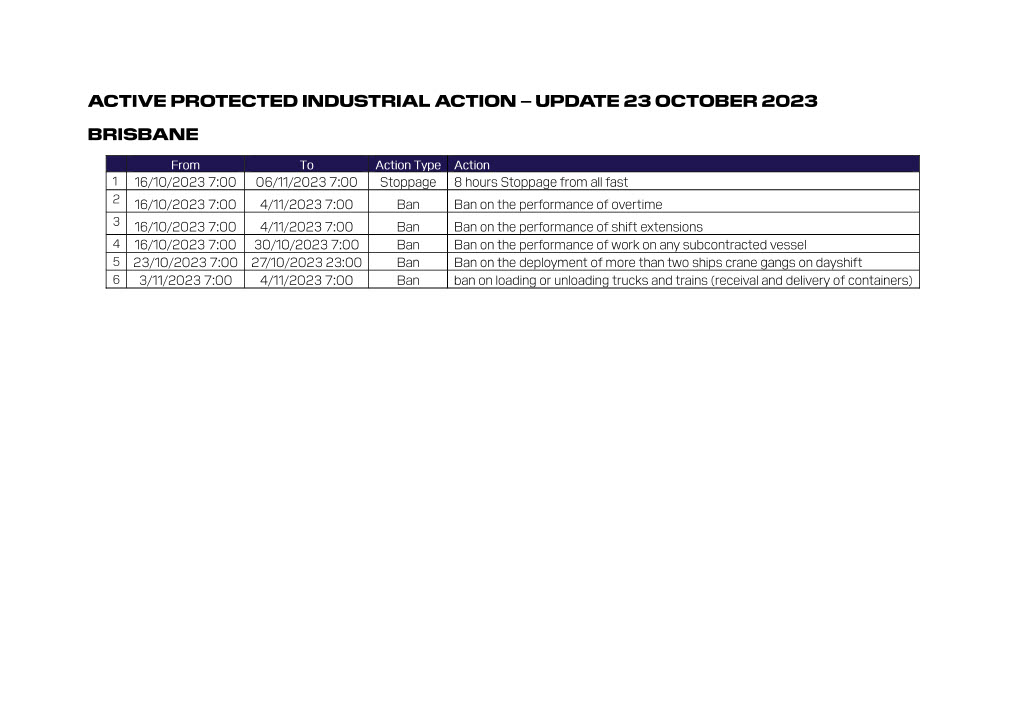
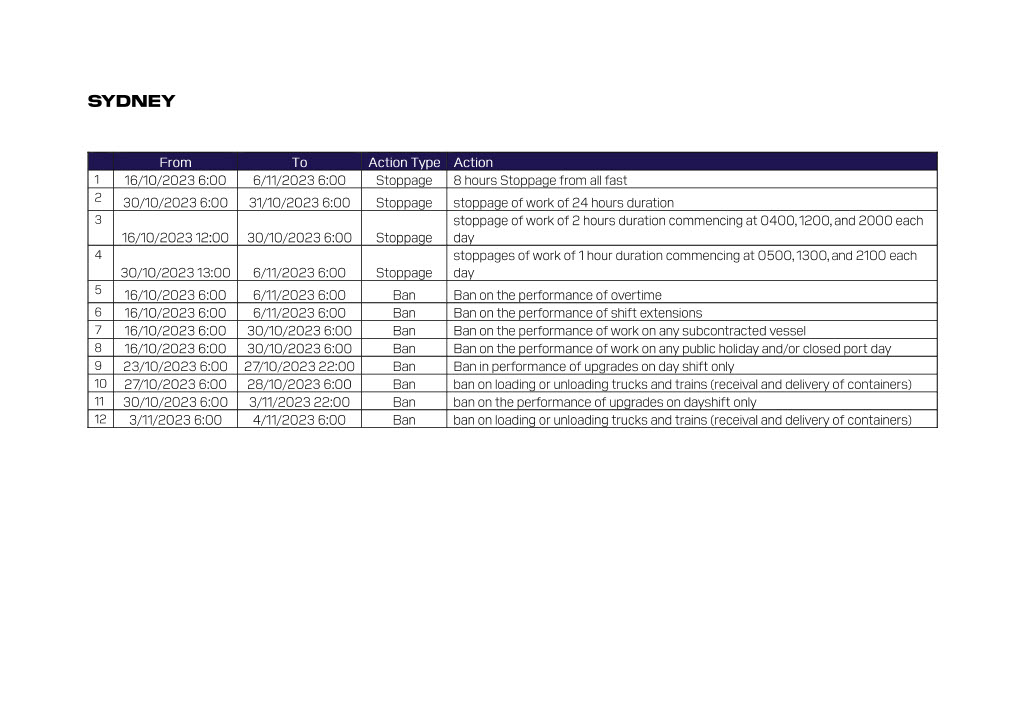
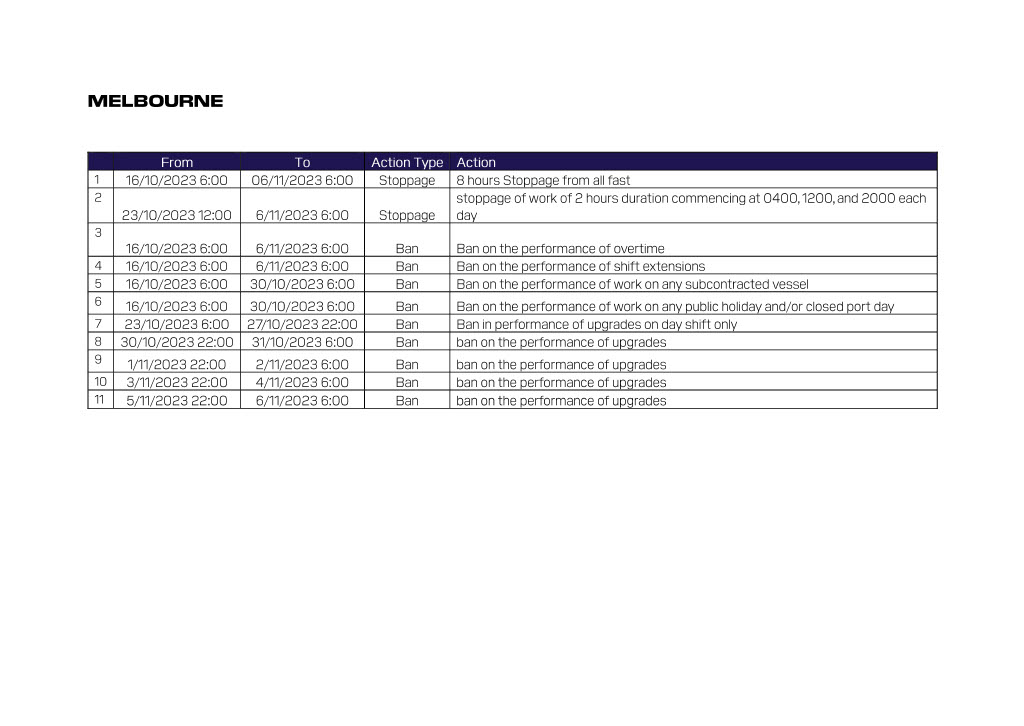
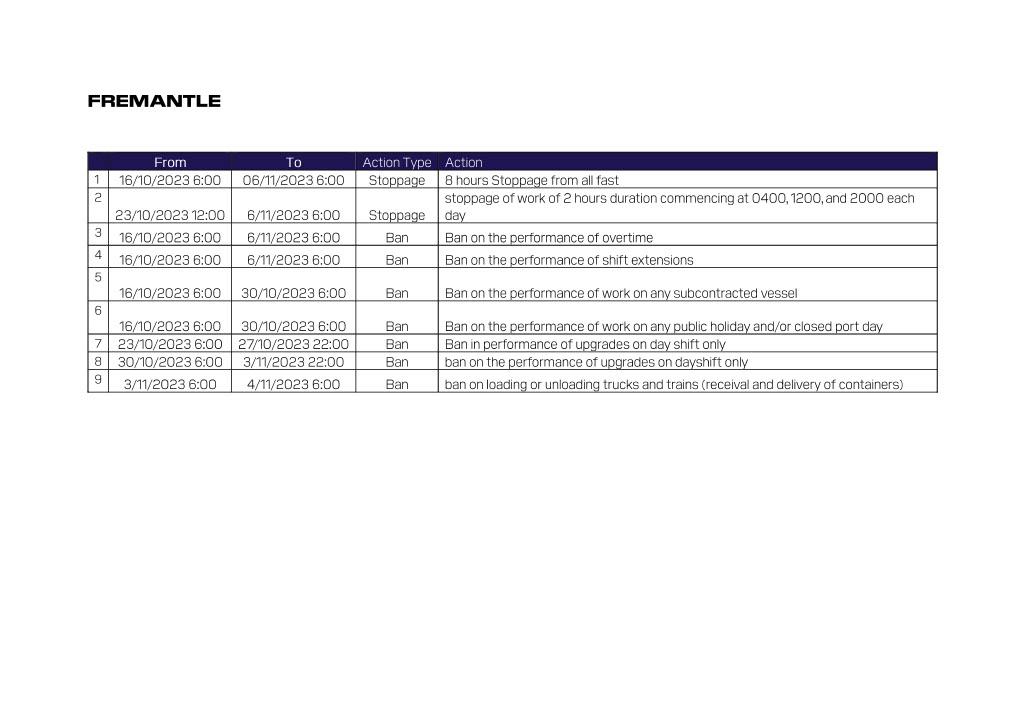
Please note that these bans & stoppages will significantly impact our services, and we appreciate your understanding and flexibility during this period. Our team is committed to minimising disruptions and ensuring the smoothest operations possible. We will keep you updated on any further developments.
We acknowledge the potential impact of these disruptions; however, please be advised that SILA will not assume liability for any additional charges arising from these industrial actions.
Thank you for your continued trust and partnership and should you have any questions or concerns, kindly reach out to our dedicated team!
SILA Imports - imports@sila.net.au
SILA Exports - exports@sila.net.au
SILA Sales - sales@sila.net.au
T: (+61) 07 3908 1690
SILA Global Pty Ltd
International Air Freight Challenges
Dear Valued Clients,
We hope this notice finds you well. We would like to inform you about some developments in the air freight industry that may impact your shipments.
- Flight Cancellations Due to Ongoing Conflict: In light of the ongoing conflict in various regions, several flights have been canceled or delayed. This situation is beyond our control and is affecting air travel around the world. As a result, it has become increasingly challenging to maintain regular schedules for air freight shipments.
- Major Airlines Prioritising Evacuation: Many major airlines have shifted their priorities to focus on evacuating individuals from war-torn countries. This shift in their operations has led to the cancellation of normal commercial flights and a reduction in available cargo space. As a result, airfreight services are being impacted, leading to delays.
- Transshipment to Alternate Airports: To navigate the current challenges, airlines are transshipping cargo to alternate airports, such as Singapore, to ensure the safety and efficiency of their operations. This change in routing may result in unavoidable delays as cargo is re-routed and processed through these alternate hubs.
We understand the importance of timely deliveries, and we are actively working to minimise disruptions as much as possible. However, it's crucial to recognise that the situation is evolving, and some delays may be unavoidable.
We recommend that you keep a close eye on your tracking information for the most up-to-date status on your shipments. If you have any concerns or require specific information about your air freight shipments, please do not hesitate to contact our team. We are committed to providing support and guidance during these challenging times.
We appreciate your understanding and patience as we navigate these unforeseen circumstances. Rest assured, we are doing everything within our power to keep your shipments on track and will keep you informed of any developments.
Thank you for your continued trust and partnership and should you have any questions or concerns, kindly reach out to our dedicated team!
SILA Imports - imports@sila.net.au
SILA Exports - exports@sila.net.au
SILA Sales - sales@sila.net.au
T: (+61) 07 3908 1690
SILA Global Pty Ltd
